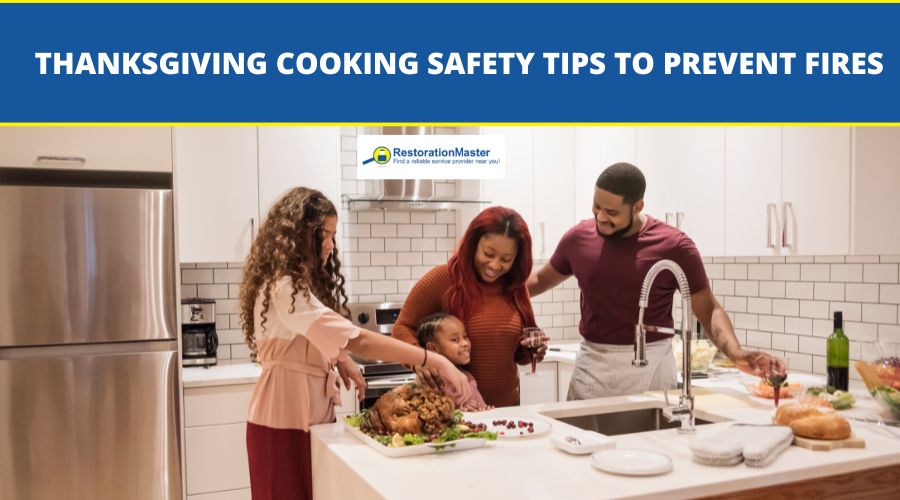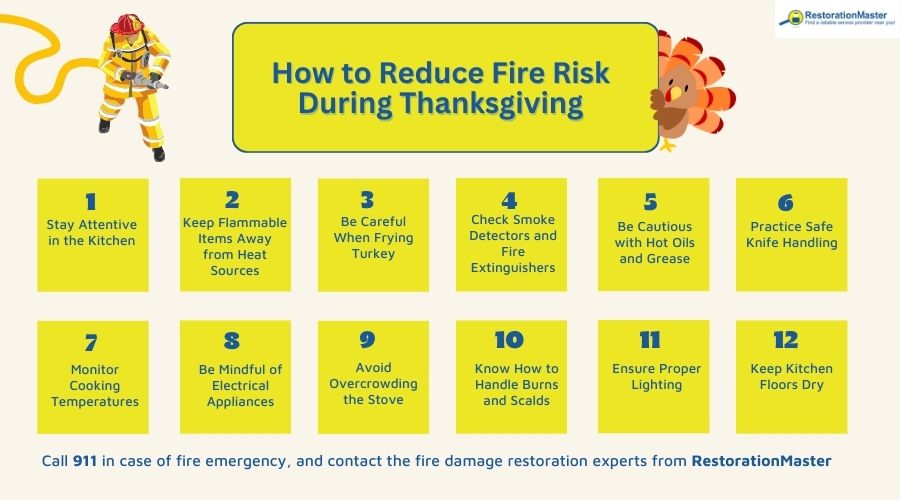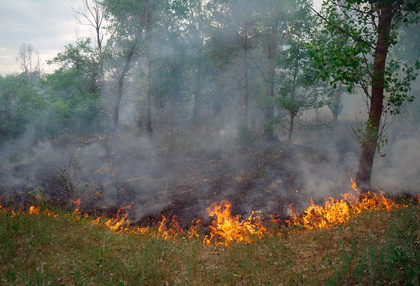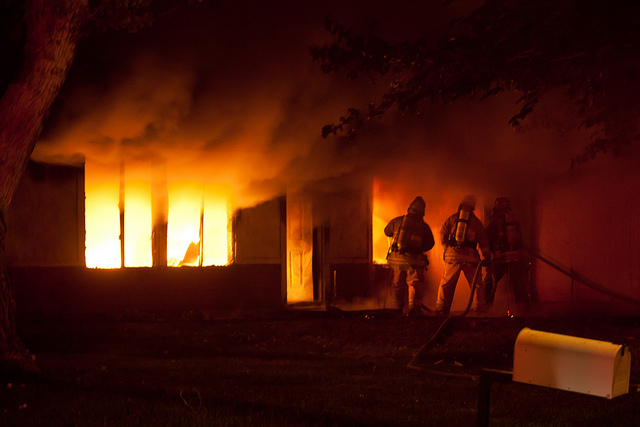Thanksgiving Cooking Safety Tips To Prevent Fires

Thanksgiving is a time for family, food, and celebration, but it’s also one of the most hazardous days for cooking-related fires. Cooking causes nearly half of all home fires in the United States. Each year, there are over 160,000 cooking fires, resulting in more than $1.2 billion in property damage, 3,000 injuries, and 500 fatalities. The risk of fires increases on Thanksgiving Day, with incidents rising by four times compared to a normal day. Unattended cooking, turkey fryers, and faulty appliances are the main causes. As we prepare for the holiday season, it’s important to take extra precautions. In this blog, we’ll share essential Thanksgiving cooking safety tips to keep you and your loved ones safe and avoid fire risks.
Causes of Cooking Fires Nationwide
Knowing what causes cooking fires is the first step in preventing them and keeping your home safe. Let’s take a look at the main reasons these fires happen and how you can avoid them.
Unattended Cooking
- 33% of cooking fires in the U.S. are caused by unattended cooking, making it the single most common cause of cooking fires.
- Leaving cooking food unattended results in about 30,000 fires each year, with a corresponding $500 million in property damage.
Frying Food
- Turkey fryers, in particular, are responsible for approximately 1,000 home fires annually. These fires typically result in more severe property damage due to the high heat of the oil used in deep frying.
- Deep-frying turkey fires cause an average of $15 million in damages annually.
Kitchen Equipment
- Faulty or malfunctioning kitchen appliances and electrical equipment cause 25% of cooking fires. This includes issues like stove malfunctions, oven defects, and problems with electrical wiring.
- In 2023, electrical failures were responsible for over 40,000 cooking-related fires in the U.S.
Thanksgiving Fire Safety Tips
Here are some detailed tips to prevent cooking accidents and minimize risks in the kitchen.

Stay Attentive in the Kitchen
- Never leave cooking food unattended: It’s easy to get distracted during the holiday hustle and bustle, but leaving a stove or oven on without supervision is a recipe for disaster. In fact, according to the National Fire Protection Association (NFPA), 33% of all cooking fires start because the person cooking left the food unattended.
- Set timers and alarms: If you’re juggling multiple dishes, use timers and kitchen alarms to remind you when something needs your attention.
Keep Flammable Items Away from Heat Sources
- Clear the area around your stove and oven: Cooking utensils, towels, or even paper napkins are all potential fire hazards if they come into contact with an open flame or hot surface.
- Store pot holders and wooden utensils away: These items are often forgotten, but they can quickly ignite if left too close to a hot stove or oven.
Be Careful When Frying Turkey
- Use a fryer outdoors: Turkey fryers can cause severe fires if used improperly. Always set up your turkey fryer outside, away from any structures, and never overfill it with oil.
- Avoid frying a frozen turkey: Frozen turkeys can cause oil to splatter or even boil over, leading to dangerous flare-ups. Ensure the turkey is completely thawed and dry before frying.
- Wear protective gear: If you must use a fryer, always wear oven mitts and protective gear to safeguard yourself from hot oil splatters.
Check Smoke Detectors and Fire Extinguishers
- Test your smoke detectors: Before starting your Thanksgiving cooking, check that your smoke alarms are working properly. Replace batteries if needed.
- Have a fire extinguisher on hand: Ensure there is a fire extinguisher in or near the kitchen. In case of a grease fireA grease fire is a fire that occurs when cooking oils or fat... More, never use water—use the fire extinguisher instead.
Be Cautious with Hot Oils and Grease
- Avoid grease buildup: Grease fires are common during Thanksgiving, especially with deep frying and pan-frying. Regularly clean out grease from cooking surfaces and avoid letting it accumulate.
- Know how to handle a grease fireA grease fire is a fire that occurs when cooking oils or fat... More: If a grease fireA grease fire is a fire that occurs when cooking oils or fat... More starts, immediately cover it with a metal lid or pour baking soda on it to smother the flames. Never use water, as it will cause the oil to splatter and worsen the fire.
Keep Children and Pets Safe
- Establish a “kid-free zone”: Keep children and pets at least three feet away from the stove, oven, or any hot surfaces. This prevents accidents from happening when little ones get curious about the cooking process.
- Use back burners when possible: When cooking with pots and pans, use the back burners to keep handles turned inward and out of reach of children or pets.
Practice Safe Knife Handling
- Cut with care: Knives are frequently used in meal preparationPreparation is the steps taken to ready a property, equipmen... More, and improper handling can leadLead is a heavy metal that can be toxic to humans, especiall... More to accidents. Always cut away from your body and ensure your knives are sharp, as dull knives can be more dangerous.
- Store knives safely: After use, store knives in a safe place, such as a block or drawer, where they are out of reach of children.
Monitor Cooking Temperatures
- Use a food thermometer: Always check the internal temperature of meats to ensure they are cooked properly and avoid foodborne illnesses. The USDA recommends cooking poultry to an internal temperature of 165°F.
- Avoid overheating oils: Keep an eye on cooking oils to prevent them from overheating and catching fire. If you notice any smoke or the oil starts to bubble aggressively, turn the heat down immediately.
Be Mindful of Electrical Appliances
- Unplug appliances when not in use: After using items like blenders, mixers, or toasters, unplug them to avoid electrical fires. Overloaded circuits and faulty wiring can easily cause sparks or short circuits.
- Keep cords away from heat: Ensure that cords from appliances, like toasters or slow cookers, don’t touch hot surfaces to prevent them from melting or sparking.
Avoid Overcrowding the Stove
- Use multiple cooking areas: When preparing large meals, avoid crowding the stove with too many pots and pans. It can cause accidents, and it’s harder to monitor everything at once.
- Maintain proper ventilationVentilation is the process of exchanging or circulating air ... More: Make sure your kitchen is well-ventilated to prevent the buildup of smoke or fumes. Open a window or use the range hood if available to keep the air circulating.
Know How to Handle Burns and Scalds
- Cool the burn immediately: If you or someone else gets burned, run the affected area under cool water for at least 10 minutes. For serious burns, seek medical attention immediately.
- Keep burn cream or gel handy: Having burn relief ointment on hand can help soothe minor burns and prevent infectionInfection is the invasion and multiplication of harmful micr... More if applied right away.
Ensure Proper Lighting
- Use bright kitchen lighting: Ensure the kitchen is well-lit so you can clearly see cooking tasks, especially when handling knives, hot oil, or preparing hot dishes. Dim lighting can leadLead is a heavy metal that can be toxic to humans, especiall... More to accidents when you’re trying to monitor multiple cooking tasks.
- Avoid using candles: While candles add ambiance, they can be a fire hazard if left unattended. Stick to using lighting fixtures rather than candles, especially near the stove or other heat sources.
Keep Kitchen Floors Dry
- Prevent slips and falls: Water or grease spills on the kitchen floor can leadLead is a heavy metal that can be toxic to humans, especiall... More to slips and falls. Always clean up spills immediately to maintain a safe cooking area.
- Use non-slip mats: Place non-slip mats in areas where water or grease is likely to accumulate, especially near the sink and cooking areas.
Turkey Fire Prevention
A fried turkey can provide extra flavor during a Thanksgiving meal, but they are also known as one of the leading causes of Thanksgiving fires. Just remember to follow these tips before firing up the fryer.
- Keep the fryer outdoors. Because it is messy, boiling grease can splatter everywhere and ruin some furnishings.
- Use an approved fryer. These have four legs, a built-in thermostatA thermostat is a device that monitors and regulates tempera... More, and are stable. You should be easily able to measure the oil’s temperature while cooking it to prevent a fire.
- Follow all instructions. Even before turning the fryer on, make sure to read all of the instructions. Be careful when choosing the right size, how to cook the turkey, and what kind of oil to use with it.
- Thaw and dry out the turkey. Remove the bag of gizzards and don’t stuff the bird before putting it in the fryer.
- Never leave the turkey fryer unattended. As soon as you turn the fryer on, never leave it alone. Also remember to use gloves instead of oven mitts; the gloves have more insulationInsulation is a material used in buildings to reduce the tra... More.
- Be careful of splashing oil. Make sure that the fryer is moved away from all combustible materials, including your property, grass, furnishings, etc.. Make sure that all bare skin is covered to prevent serious burns.
Related Read: Why You Should Reconsider Frying Your Thanksgiving Turkey
Experiencing Holiday Fires, Seek Help From RestorationMaster
For many, the holidays are the best time of the year. But they can also be one of the most dangerous as more heat-related appliances are being used. During this time, fires from stoves, ovens, furnaces, turkey fryers, candles, cords, and wiring can be the culprits of holiday disasters. If you or a loved one have already experienced a holiday fire, don’t hesitate to reach out to an emergency fire damage restorationFire damage restoration is the process of repairing and rest... More service, such as that of RestorationMaster’s.
Their technicians will not only be able to remove oily, thick residueResidue is any leftover material, such as soot, dust, or che... More from all building materials and furnishings, they are available 24/7 to arrive before time allows the damage to become permanent. They will also be able to rebuild the home using reconstruction services, a much-needed service in the event of critical damage. Within a timely manner, you can expect your home to be returned to its original condition without causing a devastating interruption to your holiday celebration.
If your family has already experienced a holiday fire, it doesn’t have to be the end for your home and furnishings. While it can seem like the disaster has ruined everything, there is still some hope for your building structureStructure refers to the framework or components of a buildin... More. Don’t hesitate to call your local RestorationMaster for emergency fire damage restoration services.
For all surfaces covered in sootSoot is fine black particles composed of carbon and other ma... More or smoke, RestorationMaster’s technicians will know exactly how to restore them to their original conditions. By using commercial products and equipment, they will be able to rebuild the home while removing all byproducts to return the property to its original condition. No matter how far the fire had spread or if it happened on Thanksgiving, you can depend on these professionals to be there for you during a property emergency.












